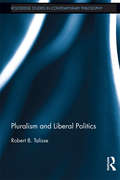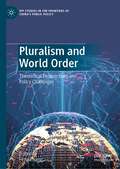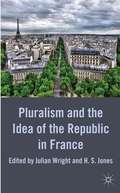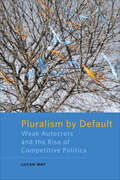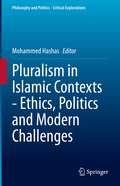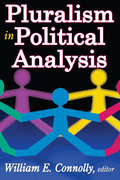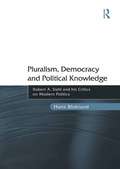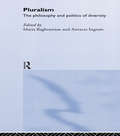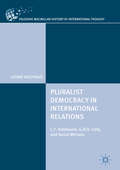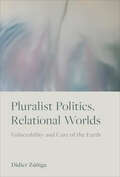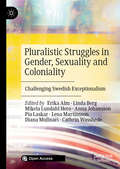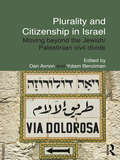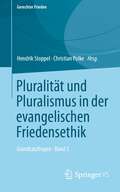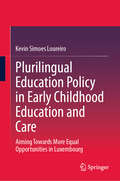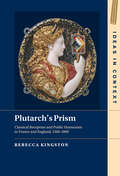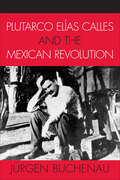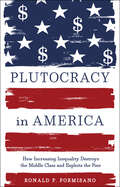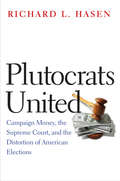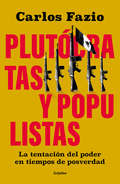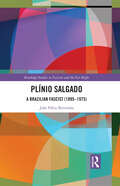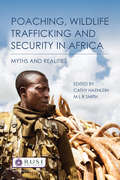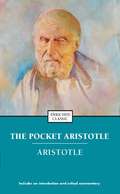- Table View
- List View
Pluralism and Liberal Politics (Routledge Studies in Contemporary Philosophy)
by Robert TalisseIn this book, Robert Talisse critically examines the moral and political implications of pluralism, the view that our best moral thinking is indeterminate and that moral conflict is an inescapable feature of the human condition. Through a careful engagement with the work of William James, Isaiah Berlin, John Rawls, and their contemporary followers, Talisse distinguishes two broad types of moral pluralism: metaphysical and epistemic. After arguing that metaphysical pluralism does not offer a compelling account of value and thus cannot ground a viable conception of liberal politics, Talisse proposes and defends a distinctive variety of epistemic pluralism. According to this view, certain value conflicts are at present undecidable rather than intrinsic. Consequently, epistemic pluralism countenances the possibility that further argumentation, enhanced reflection, or the acquisition of more information could yield rational resolutions to the kinds of value conflicts that metaphysical pluralists deem irresolvable as such. Talisse’s epistemic pluralism hence prescribes a politics in which deep value conflicts are to be addressed by ongoing argumentation and free engagement among citizens; the epistemic pluralist thus sees liberal democracy is the proper political response to ongoing moral disagreement.
Pluralism and World Order: Theoretical Perspectives and Policy Challenges (IPP Studies in the Frontiers of China’s Public Policy)
by Feng ZhangThis volume explores the implications of pluralism for international order. Distinguished contributors from around the world offer insights into the character of a pluralistic world order. They focus especially on the manifestations of international pluralism in great power relations, multilateralism, and regionalism. Contributors examine the myriad challenges a pluralistic world order will face in the years ahead, yet they eschew alarmist conclusions. There is still scope for the great powers to better manage their relations, and equally important, much space for multilateralism and regionalism to play their increasingly important roles in stabilizing world order. Distinctive in bringing the themes of pluralism and world order together in both theoretical exposition and policy discussion, this book offers a stimulating reading for scholars and practitioners of world politics.
Pluralism and the Idea of the Republic in France
by Julian Wright H. S. JonesThe idea of the centralized State has played a powerful role in shaping French republicanism. But for two hundred years, many have tried to find other ways of being French and Republican. These essays challenge the traditional account, bringing together new insights from leading scholars.
Pluralism by Default: Weak Autocrats and the Rise of Competitive Politics
by Lucan WayAn audacious new explanation for the emergence of political pluralism in weak states.Pluralism by Default explores sources of political contestation in the former Soviet Union and beyond. Lucan Way proposes that pluralism in "new democracies" is often grounded less in democratic leadership or emerging civil society and more in the failure of authoritarianism. Dynamic competition frequently emerges because autocrats lack the state capacity to steal elections, impose censorship, or repress opposition. In fact, the same institutional failures that facilitate political competition may also thwart the development of stable democracy.
Pluralism by Default: Weak Autocrats and the Rise of Competitive Politics
by Lucan Way“Pluralism by Default will change the way we understand the emergence of democracies and the consolidation of autocracies.” —Chrystia Freeland, author of PlutocratsExploring sources of political contestation in the former Soviet Union and beyond, Pluralism by Default proposes that pluralism in “new democracies” is often grounded less in democratic leadership or emerging civil society and more in the failure of authoritarianism. Dynamic competition frequently emerges because autocrats lack the state capacity to steal elections, impose censorship, or repress opposition. In fact, the same institutional failures that facilitate political competition may also thwart the development of stable democracy.“A tour de force brimming with theoretical originality and effective use of in-depth case studies. It will enrich our understanding of post-communist politics and help reshape the way we think about democracy, authoritarianism, and regime change more broadly.” —M. Steven Fish, author of Democracy Derailed in Russia: The Failure of Open Politics
Pluralism in Islamic Contexts - Ethics, Politics and Modern Challenges (Philosophy and Politics - Critical Explorations #16)
by Mohammed HashasThis book brings together international scholars of Islamic philosophy, theology and politics to examine these current major questions: What is the place of pluralism in the Islamic founding texts? How have sacred and prophetic texts been interpreted throughout major Islamic intellectual history by the Sunnis and Shi‘a? How does contemporary Islamic thought treat religious and political diversity in modern nation states and in societies in transition? How is pluralism dealt with in modern major and minor Islamic contexts? How does modern political Islam deal with pluralism in the public sphere? And what are the major internal and external challenges to pluralism in Islamic contexts? These questions that have become of paramount relevance in religious studies especially during the last three-four decades are answered as critically highlighted in Islamic founding sources, the formative classical sources and how it has been lived and practiced in past and present Islamic majority societies and communities around the world. Case studies cover Egypt, Turkey, Indonesia, and Thailand, besides various internal references to other contexts.
Pluralism in Political Analysis
by Francis A. O'ConnellThe theory of democratic pluralism has long provided the dominant ideal and description of politics in industrial societies with competing party systems. The purpose of this classic collection, including some of the leading theorists of the late 1960s, is to subject this theory to systematic scrutiny. The authors examine the work of such pluralists as Robert Dahl, David Truman, Adolf Berle, Arthur Bentley, Joseph Schumpeter, and Walter Lippmann, as well as of such critics of pluralist theory as C. Wright Mills, Herbert Marcuse, Henry Kariel, and Grant McConnell.Voicing the respective points of view of science, economics, philosophy, and psychology, the authors converge in their agreement that the conventional, pluralist interpretation of contemporary politics requires significant revision. The views of these diverse critics coalesce into the outline of what they see as a more enlightened political ideal and a more relevant descriptive theory. This collective portrait offers a provocatively new interpretative framework for the understanding of the politics of contemporary industrial society.Connolly includes a sophisticated discussion of such concepts as power, decision-making, politics, and interest groups and devotes considerable attention to the need to promote positive change, particularly where the pluralist system shows bias against certain segments of society as well as against some dimensions of social life affecting everyone's existence in the society. Intended for use in Comparative Government, Contemporary Political Theory, Political Parties and Pressure Groups, and advanced courses in American Government, this volume remains a challenging resource for those dealing with the nature and possible change of the organization of contemporary democratic society.
Pluralism, Democracy and Political Knowledge: Robert A. Dahl and his Critics on Modern Politics
by Hans BloklandThe political discontent or malaise that typifies most modern democracies is mainly caused by the widely shared feeling that the political freedom of citizens to influence the development of their society and, related to this, their personal life, has become rather limited. We can only address this discontent when we rehabilitate politics, the deliberate, joint effort to give direction to society and to make the best of ourselves. In Pluralism, Democracy and Political Knowledge, Hans Blokland examines this challenge via a critical appraisal of the pluralist conception of politics and democracy. This conception was formulated by, above all, Robert A. Dahl, one of the most important political scholars and democratic theorists of the last half century. Taking his work as the point of reference, this book not only provides an illuminating history of political science, told via Dahl and his critics, it also offers a revealing analysis as to what progress we have made in our thinking on pluralism and democracy, and what progress we could make, given the epistemological constraints of the social sciences. Above and beyond this, the development and the problems of pluralism and democracy are explored in the context of the process of modernization. The author specifically discusses the extent to which individualization, differentiation and rationalization contribute to the current political malaise in those countries which adhere to a pluralist political system.
Pluralism: The Philosophy and Politics of Diversity
by Maria Baghramian and Attracta IngramCultural, moral and religious diversity is a pervasive feature of modern life, yet has only recently become the focus of intellectual debate. Pluralism is the first book to tackle philosophical pluralism and link pluralist themes in philosophy to politics. A range of essays investigates the philosophical sources of pluralism, the value of pluralism and liberalism, and difference in pluralism, including writings on women and the public-private distinction.This is a valuable source for students of philosophy, politics and cultural studies.
Pluralist Democracy in International Relations: L. T. Hobhouse, G. D. H. Cole, And David Mitrany (The\palgrave Macmillan History Of International Thought Ser.)
by Leonie HolthausThis book demonstrates the importance of democracy for understanding modern international relations and recovers the pluralist tradition of L.T. Hobhouse, G.D.H. Cole, and David Mitrany. It shows that pluralism’s typical interest in civil society, trade unionism, and transnationalism evolved as part of a wide-ranging democratic critique that representative democracies are hardly self-sustaining and are ill-equipped to represent all entitled social and political interests in international relations. Pluralist democratic peace theory advocates transnational loyalties to check nationalist sentiments and demands the functional representation of social and economic interests in international organizations. On the basis of the pluralist tradition, the book shows that theories about domestic democracy and international organizations co-evolved before scientific liberal democratic peace theory introduced new inside/outside distinctions.
Pluralist Politics, Relational Worlds: Vulnerability and Care of the Earth
by Didier ZúñigaIn Pluralist Politics, Relational Worlds, Didier Zúñiga examines the possibility for dialogue and mutual understanding in human and more-than-human worlds. The book responds to the need to find more democratic ways of listening to, giving voice to, and caring for the variety of beings that inhabit the earth. Drawing on ecology and sustainability in democratic theory, Zúñiga demonstrates the transformative potential of a relational ethics that is not only concerned with human animals, but also with the multiplicity of beings on earth, and the relationships in which they are enmeshed. The book offers ways of cultivating and fostering the kinds of relations that are needed to maintain human and more-than-human diversity in order for life to persist. It also calls attention to the quality of the relationships that are needed for life to flourish, advancing our understanding of the diversity of pluralism. Pluralist Politics, Relational Worlds ultimately presses us to question our own condition of human animality so that we may reconsider the relations we entertain with one another and with more-than-human forms of life on earth.
Pluralistic Struggles in Gender, Sexuality and Coloniality: Challenging Swedish Exceptionalism
by Linda Berg Diana Mulinari Lena Martinsson Anna Johansson Cathrin Wasshede Erika Alm Mikela Lundahl Hero Pia LaskarThis open access book seeks to understand how politics is being made in a pluralistic sense, and explores how these political struggles are challenging and transforming gender, sexuality, and colonial norms. As researchers located in Sweden, a nation often cited as one of the most gender-equal and LGBTQ-tolerant nations, the contributions investigate political processes, decolonial struggles, and events beyond, nearby, and in between organizations, states, and national territories. The collection represents a variety of disciplines, and different theoretical conceptualizations of politics, feminist theory, and postcolonial and queer studies. Students and researchers with an interest of queer studies, gender studies, critical whiteness studies, and civil society studies will find this book an invaluable resource.
Plurality and Citizenship in Israel: Moving Beyond the Jewish/Palestinian Civil Divide (Routledge Studies in Middle Eastern Politics)
by Dan Avnon Yotam BenzimanIsrael's political process is too often framed in terms of a dichotomy between Jewish and Arab/Palestinian citizens of the state, a framing which perpetuates political inequality and consequent injustices. This book focuses on the conflict within Israel and the role played by modern states in either mitigating majority-minority conflict or exacerbating it.This comparative study concentrates on theoretical models and historical, legal or political patterns of development. With an emphasis on alternative approaches to alleviating civic and political inequality in a divided society such as Israel's, the book examines plurality and political pluralism as keys to enhancing Israel's democratic character. The dozen original essays address many of the basic points of contention between Jews and Arab/Palestinians within the Israeli civic body: unequal access to citizenship; unequal access to land; discrimination in access to public services; insufficient defence of minority rights in Israel's legal system; unequal obligations; unequal economic opportunities. The essays raise a matter of principle that goes beyond the Israeli case: formal legal measures are relatively worthless if they are not preceded by political processes that are oriented to changing conceptions and perceptions of reality. Relevant to those who wish to understand the unobserved dynamics within a divided society, this book will be of particular interest to students of comparative politics, conflict resolution and Middle East studies.
Pluralität und Pluralismus in der evangelischen Friedensethik: Grundsatzfragen • Band 5 (Gerechter Frieden)
by Christian Polke Hendrik StoppelDieses Buch thematisiert Pluralität und Pluralismus in der evangelischen Friedensethik. Denn die Kirche kann nur und muss letztendlich im Rahmen des politischen und weltanschaulich-religiösen Pluralismus agieren. Ob sie dabei selbst als eine einheitliche Stimme auftreten soll, ist Gegenstand der Diskussion. Sie selbst ist schließlich intern immer schon plural verfasst, gesellschaftlich aber eben auch die Kirche. Das verschärft die Frage nach der Stimme der Kirche: Geht ihren Äußerungen ein interner Klärungsprozess voraus, der den inneren Pluralismus zu eben jener einen Stimme zusammenführt oder nimmt die Kirche in Form mehrerer einzelner Stimmen am pluralistischen Konzert teil? Diese Fragen beantwortet der Sammelband aus verschiedenen, nicht nur kirchlichen, Perspektiven.
Plurilingual Education Policy in Early Childhood Education and Care: Aiming Towards More Equal Opportunities in Luxembourg
by Kevin Simoes LoureiroThis book explores the implementation of educational policies aimed at addressing educational inequalities and specifically focuses on Luxembourg’s pioneering plurilingual education policy in non-formal early childhood education and care. It emphasizes the significance of developing plurilingual policies that accommodate diverse linguistic and organizational contexts, ensuring more effective implementation and equitable educational opportunities for all children. Through an in-depth analysis, this book provides insights into various aspects of policy implementation. It delves into the drivers and goals of the plurilingual policy, the measures taken to implement it, the challenges encountered, and the success factors identified at the policy level. Additionally, it examines the attitudes, intentions and obstacles faced by those involved at the practice level. Drawing on a range of theoretical frameworks and empirical studies, the book presents multiple perspectives on the subject. By employing a mixed-methods design, including policy document analysis of the plurilingual education program, expert interviews with policy-level stakeholders and a cross-sectional survey of early childhood practitioners in the non-formal education sector, this work offers a multifaceted approach. The book not only enhances the understanding of policy implementation processes, but also sheds light on the practical implications and potential for reducing educational inequalities in multilingual educational settings. The findings and discussions in this book are, thus, pertinent not only to Luxembourg, but also offer policy- and practice-related implications for similar educational contexts globally.
Plutarch's Prism: Classical Reception and Public Humanism in France and England, 1500–1800 (Ideas in Context #142)
by Rebecca KingstonThroughout the early modern period, political theorists in France and England drew on the works of Plutarch to offer advice to kings and princes. Elizabeth I herself translated Plutarch in her later years, while Jacques Amyot's famous translations of Plutarch's The Parallel Lives led to the wide distribution of his work and served as a key resource for Shakespeare in the writing of his Roman plays, through Sir Thomas North's English translations. Rebecca Kingston's new study explores how Plutarch was translated into French and English during the Renaissance and how his works were invoked in political argument from the early modern period into the 18th century, contributing to a tradition she calls 'public humanism'. This book then traces the shifting uses of Plutarch in the Enlightenment, leading to the decline of this tradition of 'public humanism'. Throughout, the importance of Plutarch's work is highlighted as a key cultural reference and for its insight into important aspects of public service.
Plutarch’s Politics
by Hugh LiebertPlutarch's Lives were once treasured. Today they are studied by classicists, known vaguely, if at all, by the educated public, and are virtually unknown to students of ancient political thought. The central claim of this book is that Plutarch shows how the political form of the city can satisfy an individual's desire for honor, even under the horizon of empire. Plutarch's argument turns on the difference between Sparta and Rome. Both cities stimulated their citizens' desire for honor, but Sparta remained a city by linking honor to what could be seen first-hand, whereas Rome became an empire by liberating honor from the shackles of the visible. Even under the rule of a distant power, however, allegiances and political actions tied to the visible world of the city remained. By resurrecting statesmen who thrived in autonomous cities, Plutarch hoped to rekindle some sense of the city's enduring appeal. "
Plutarco Elías Calles and the Mexican Revolution (Latin American Silhouettes)
by Jürgen BuchenauThis biography of the Mexican revolutionary examines his rise from soldier to president to his continued influence as Jefe Maximo. Hailing from the border state of Sonora, Plutarco Elías Calles found his calling in the early years of the revolution, quickly rising to national prominence. As president from 1924 to 1928, Calles undertook an ambitious reform program, modernized the financial system, and defended national sovereignty against an interventionist U.S. government. Yet these reforms failed to eradicate underdevelopment, corruption, and social injustice. Moreover, his unyielding campaigns against political enemies and the Catholic Church earned him a reputation as a repressive strongman. After his term as president, Calles continued to exert broad influence as his country's foremost political figure while three weaker presidents succeeded each other in an atmosphere of constant political crisis. He played a significant role in founding a ruling party that reined in power-hungry military leaders and helped workers attain better living conditions. This dynastic party and its successors, including the present-day Partido Revolucionario Institucional (Party of the Institutional Revolution), remained in power until 2000. Through this comprehensive assessment of a quintessential Mexican politician, Buchenau opens an illuminating window into both the Mexican Revolution and contemporary Mexico.
Plutocracy in America: How Increasing Inequality Destroys the Middle Class and Exploits the Poor
by Ronald P. FormisanoA hard-hitting analysis of how the disparity between wealth and poverty undermines the common good.The growing gap between the most affluent Americans and the rest of society is changing the country into one defined—more than almost any other developed nation—by exceptional inequality of income, wealth, and opportunity. This book reveals that an infrastructure of inequality, both open and hidden, obstructs the great majority in pursuing happiness, living healthy lives, and exercising basic rights. A government dominated by finance, corporate interests, and the wealthy has undermined democracy, stunted social mobility, and changed the character of the nation. In this tough-minded dissection of the gulf between the super-rich and the working and middle classes, Ronald P. Formisano explores how the dramatic rise of income inequality over the past four decades has transformed America from a land of democratic promise into one of diminished opportunity. Since the 1970s, government policies have contributed to the flow of wealth to the top income strata. The United States now is more a plutocracy than a democracy. Formisano surveys the widening circle of inequality’s effects, the exploitation of the poor and the middle class, and the new ways that predators take money out of Americans’ pockets while passive federal and state governments stand by. This data-driven book offers insight into the fallacy of widespread opportunity, the fate of the middle class, and the mechanisms that perpetuate income disparity.
Plutocrats United
by Richard L. HasenCampaign financing is one of today's most divisive political issues. The left asserts that the electoral process is rife with corruption. The right protests that the real aim of campaign limits is to suppress political activity and protect incumbents. Meanwhile, money flows freely on both sides. In "Plutocrats United, "Richard Hasen argues that both left and right avoid the key issue of the new Citizens United era: balancing political inequality with free speech. The Supreme Court has long held that corruption and its appearance are the only reasons to constitutionally restrict campaign funds. Progressives often agree but have a much broader view of corruption. Hasen argues for a new focus and way forward: if the government is to ensure robust political debate, the Supreme Court should allow limits on money in politics to prevent those with great economic power from distorting the political process. "
Plutócratas y populistas: La tentación del poder en tiempos de posverdad
by Carlos FazioEl rostro del poder ha cambiado. Y el peligro para la democracia aumentó En los últimos años, en todo el mundo -y notablemente en Latinoamérica- se han acentuado tendencias políticas y económicas que amenazan con construir un planeta más injusto, más polarizado y más violento. El ascenso del populismo, el empoderamiento de las fuerzas armadas,la intensificación del poder mediático y el consecuente fortalecimiento de las oligarquías se han convertido en un círculo vicioso que está dejando una sarta de víctimas colaterales, entre las que destacanla justicia social, la búsqueda de la igualdad, la inclusión, la generación de riqueza sostenible, el poder de la ciudadanía... En esta obra, Carlos Fazio disecciona el proceso, explica cómo fue que esta dinámica nos llegó a parecer normal y delinea los riesgos a los que nos enfrentamos de no detenerla inmediatamente.
Plínio Salgado: A Brazilian Fascist (1895–1975) (Routledge Studies in Fascism and the Far Right)
by João Fábio BertonhaPlínio Salgado covers the life trajectory of the far-right Brazilian political leader between 1895 and 1975. The book initially follows his life from his birth, including political and cultural training and political activities between 1895 and 1930. The focus then shifts to his period as leader of the Brazilian fascist movement between 1932 and 1938, with attention to his performance as a leader, his role within the movement, and in the rise and fall of the Integralist Action. His period of exile in Portugal between 1939 and 1947 is also emphasized, with a special focus on his contacts with the Portuguese radical right and German and Italian agents. The final part addresses his return to Brazil, his efforts to reposition himself politically and his performance as a parliamentarian and supporter of the military coup of 1964. This book will be of interest to researchers of Latin American history, Brazilian history and politics, the transnational far right, and comparative fascism studies.
Poaching, Wildlife Trafficking and Security in Africa: Myths and Realities (Whitehall Papers)
by Cathy Haenlein M L SmithA worldwide surge in poaching and wildlife trafficking is threatening to decimate endangered species. This crisis also threatens the security of human beings in ways ignored until recently by decision-makers slow to begin to treat what is typically viewed as a ‘conservation issue’ as serious crime. Over the past decade, as the scale and profitability of poaching and wildlife trafficking have grown, politicians, journalists and campaigners throughout the world have begun to take notice – they are offering striking appraisals of the threat posed not only to endangered species but also to human populations. Many of these appraisals, however, are made in the absence of a detailed body of empirical research and analysis to underpin them. The result is the growth of a range of myths and misperceptions around the security threats posed, particularly as they relate to Africa. Poaching, Wildlife Trafficking and Security in Africa examines the most common narratives on poaching, wildlife trafficking and security. It critically analyses the dominant discourses on poaching and wildlife trafficking as threats to human security, as drivers of conflict, as funders of terrorism and as a focus for organised crime. In doing so, it seeks to sort myth from reality, to clarify how poaching and wildlife trafficking, as much cited threats to security, can most accurately be conceived. Such a study is crucial to the efforts of stakeholders now rightly looking to respond not just to the threat posed to endangered species, but also to the security and wellbeing of human beings.
Pocket Aristotle (Enriched Classics)
by Aristotle Justin KaplanIn this volume of selections from Aristotle, Justin D. Kaplan has included the most widely read, studied, and quoted works of the great philosopher. The editor's notes give the reader a convenient and concise review of each work.
Pocket Bios: John F. Kennedy (Pocket Bios)
by Al BerengerA colorfully illustrated, pocket-size picture book biography about John F. Kennedy, 35th President of the United States.John F. Kennedy was an incredibly popular American politician who served as 35th President of the United States from 1961 to 1963, during the Cold War. As president, he most notably supported the African American Civil Rights Movement, authorized the Bay of Pigs invasion on the southern coast of Cuba, and dealt with the Cuban Missile Crisis. His family was greatly admired around the world, and his tragic assassination in Dallas, Texas, had a lasting effect on the American psyche. About the Pocket Bios series:Pocket Bios are full of personality, introducing readers to fascinating figures from history with simple storytelling and cheerful illustrations. Titles include men and women from history, exploration, the sciences, the arts, the ancient world, and more. Looking for biographies about political figures? Don't miss the Pocket Bios for Abraham Lincoln, Nelson Mandela, Rosa Parks, Martin Luther King Jr., and Gandhi.
